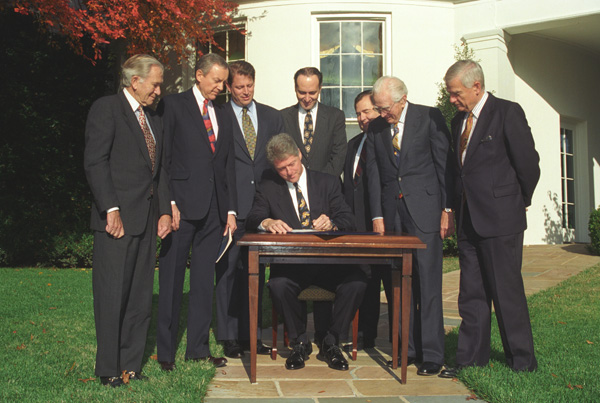This week marks 30 years since President Clinton unfortunately signed into law the Religious Freedom Restoration Act (RFRA).
A coalition of almost 70 organizations, spanning from conservative Christian organizations such as the Alliance Defending Freedom to the more liberal ACLU, heralded its passage back then, claiming it would protect religious freedom rights for all. The Freedom From Religion Foundation (FFRF) has been outspoken against this law from the outset, understanding from the beginning that this law would be used as a weapon to elevate religion above reason.
Three years before Clinton signed RFRA into law, its wheels were thrust into motion when the U.S. Supreme Court heard Employment Division v. Smith. In this case, two employees of a private substance abuse facility in Oregon were denied unemployment benefits after they were fired for ingesting peyote, a hallucinogenic drug, for what they claimed were sacramental purposes at a ceremony of their Native American Church. The high court ultimately ruled that their First Amendment rights were not violated, because the anti-drug law applied to everyone equally. In short, a person’s individual religious beliefs cannot trump a neutral law that applies to everyone.
Religious hysteria ensued. Congress acted quickly to right a perceived wrong by the Supreme Court. Enacting what is essentially a superstatute, Congress passed legislation countering Smith’s correct ruling. This legislation effectively forced the government to carve out religious exceptions to every law, even when that undermines the best interest of the public. RFRA allows an individual’s personal religious beliefs to trump laws meant to protect all Americans.
The legislation was passed by an overwhelming majority of Congress. At the time, it was viewed as a way to protect minority religions against unnecessary government restrictions of their religious practices.
In 1997, the Supreme Court ruled RFRA unconstitutional as applied to the states, but applicable under federal law, in a case known as city of Boerne v. Flores. Professor Marci Hamilton, a longtime friend of FFRF and ally in the fight against RFRA, argued the case, and talks more about the impact of the law on religious liberty in the United States in this month’s episode of the We Dissent podcast. As a result of the court’s ruling in Boerne, about 20 states have enacted a state RFRA based on the federal law.
Over the last three decades, as FFRF predicted, Christians weaponized the law to justify bigotry in the name of religion. Look no further than Burwell v. Hobby Lobby Stores, the highly publicized case from a few years ago that allowed corporations to deny their employees’ health care benefits in the name of religion. FFRF filed an amicus brief in the case calling upon the justices to declare RFRA unconstitutional. FFRF’s brief was the only one to make this “bold challenge” as described by SCOTUSblog, the Peabody Award-winning Supreme Court blog. FFRF argued that RFRA actually violates the Establishment Clause because it forces an employee who may not share the religious beliefs as their employer to adhere to those beliefs, among other constitutional infirmities.
The Trump administration used RFRA as the justification to override anti-discrimination protections in federally funded programs. In one of the most abhorrent examples, Trump’s Department of Health and Human Services granted a request from the state of South Carolina to waive federal religious nondiscrimination requirements for federally funded child foster care agencies. One agency that received almost $1 million under Trump had turned away families who are Catholic, Jewish or LGBTQ-plus.
Recently, members of Congress have started to take steps to remedy the weaponization of RFRA. Through the Do No Harm Act, legislators in both chambers of Congress seek to return RFRA “to its original purpose, which is to protect religious exercise while ensuring religious freedom is not used to erode civil rights protections.” The bill states that RFRA would not apply in circumstances where a religious exemption could cause harm to others. Specifically, the bill limits the application of RFRA from being used against:
Nondiscrimination laws;
Employment laws governing wages and collective bargaining;
Child labor and protection laws;
Access to health care;
Services provided through a government contract or grant; and
Services by government officials.
On this anniversary, FFRF reflects on how much harm has been done in the name of RFRA. It’s bad for women, LGBTQ-plus, business, and true religious liberty. FFRF calls on lawmakers to repeal RFRA, or at the very least, urges those in power to take steps, like those taken by the sponsors of the Do No Harm Act, to ensure that RFRA can no longer be weaponized by the religious right.
The Freedom From Religion Foundation is a national nonprofit organization with over 40,000 members across the country. Our purposes are to protect the constitutional principle of separation between state and church, and to educate the public on matters relating to nontheism.
If you are an FFRF member, sign into your account here and then update your email subscriptions here.
To become an FFRF member, click here. To learn more about FFRF, request information here.


